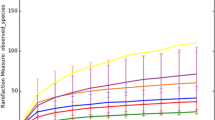Abstract.
A hydrogen-producing sludge degraded 99% of glucose at 36 °C and pH 5.5, producing a methane-free biogas (comprising 64% hydrogen) and an effluent comprising mostly butyrate, acetate, and ethanol. The yield was 0.26 l H2 g–1 glucose and the production rate per gram of volatile suspended solids was 4.6 l H2 day–1. A 16S rDNA library was constructed from the sludge for microbial species determination. A total of 96 clones were selected for plasmids recovery, screened by denaturing gradient gel electrophoresis, and sequenced for rDNA. Based on the phylogenetic analysis of the rDNA sequences, 64.6% of all the clones were affiliated with three Clostridium species (Clostridiaceae), 18.8% with Enterobacteriaceae, and 3.1% with Streptococcus bovis (Streptococcaceae). The remaining 13.5% belonged to eight operational taxonomic units, the affiliations of which were not identified.
Similar content being viewed by others
Author information
Authors and Affiliations
Additional information
Electronic Publication
Rights and permissions
About this article
Cite this article
Fang, .H., Zhang, .T. & Liu, .H. Microbial diversity of a mesophilic hydrogen-producing sludge. Appl Microbiol Biotechnol 58, 112–118 (2002). https://doi.org/10.1007/s00253-001-0865-8
Received:
Revised:
Accepted:
Issue Date:
DOI: https://doi.org/10.1007/s00253-001-0865-8




